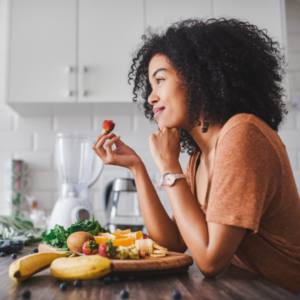Should You Snack?

There are many things that prompt us to eat, very few of which have to do with hunger. So, should you snack?
We might take our cues from a colleague opposite, whose cinnamon muffin compels us to the cafeteria; or perhaps stressful news makes us seek comfort in the pantry.
We are creatures of habit and if we’ve spent the last 10 years indulging in a packet of crisps at 4pm, it can take some adjustment to allow ourselves to go without.
In my previous life as a journalist, I had the privilege of interviewing Dr Stephen Domenig, then medical director of The Original Fx Mayr clinic in Austria. The clinic focuses on gut health and encourages guests to give their bellies a break.
‘The problem now is that we overeat all the time and that tires out the digestive organs,’ said Dr. Domenig. ‘At the clinic, we teach people to slow down, to eat smaller portions and to put their cutlery down between bites.’
When you eat more slowly, your blood sugar doesn’t spike, but rises gradually. This helps us feel fuller for longer. Unfortunately, most of us don’t take the time to savour each bite; we eat on the go, in a rush and our brains barely register the falafel sandwich we just wolfed down. This leads us to eat more, often between meals.
In 1977 the average time between meals for adults was 4.4 hours. By 2006 that window had shrunk to a mere 3.5 hours. (1)
So are there any benefits to eating less often, as previous generations did? Here are some thoughts on slowing down and snacking less.
Eat Less
We are told that snacking helps to balance blood sugar and stops us overeating, but research says otherwise. In 1977 we consumed on average 2,090 calories a day; by 2006 it had increased to 2,533. The main source of this extra energy? Snack food.
Happier Stomach and Pancreas
When you’re constantly making demands on your digestive system, and denying it a break, it’s harder to manage blood sugar levels. When you snack between meals your pancreas gets
no rest, as you are constantly triggering insulin production. This leads to more blood sugar spikes – especially if you’re snacking on simple carbs like bread, biscuits or water crackers.
Lose Weight
Three to six hours is the time it takes the body to start releasing energy from our fat stores. In other words, if you really want to kick start your metabolism, you need to quit grazing.
There is also evidence to suggest that longer periods between meals increase the microbial diversity of your colon, which has a positive effect on weight and metabolism. A Danish study published in the journal Nature found that people who are obese have fewer and less diverse gut bacteria than their leaner counterparts. (2)
Gut-bacteria induced weight gain is a real thing. Researchers from the University of Iowa recently likened the effects of negative gut bacteria to eating ‘one additional cheeseburger every single day. (3)
When Snacking Makes Sense
If there is one thing I’ve learnt as a Nutritional Therapist, it’s that no human body is the same and our needs continually change as our bodies evolve.
During pregnancy, particularly in the first trimester, blood sugar levels fluctuate and snacking is something I do recommend (I had salty cashews close at hand in both my pregnancies).
Eating after a vigorous workout, also makes sense. Following intense physical activity your body naturally enters a catabolic (muscle breakdown) phase and eating protein five to fifteen
minutes after training can aid recovery.
And finally, if you have a gap longer than 6 hours between finishing lunch and eating dinner then I do recommend you eat a protein-rich snack between 3 or 4pm.
But for most of us, learning to reconnect with our hunger is a valuable lesson. By constantly picking, we’ve forgotten what it feels like to be truly ravenous and are denying ourselves the pleasure of tucking into a much-anticipated meal. We all know food tastes better if we wait a little longer, as the saying goes, ‘hunger is the best sauce.’
About Laura
Laura is a qualified Nutritional Therapist and writer who works with a broad range of clients. She specialises in helping women have a healthy pregnancy, supporting children to eat a wider variety of foods (… starting from six months old) and she encourages all her clients to reduce their risk of cancer, using evidence-based nutritional strategies. She can also run lab-tests including comprehensive stool tests and DUTCH hormone tests.


